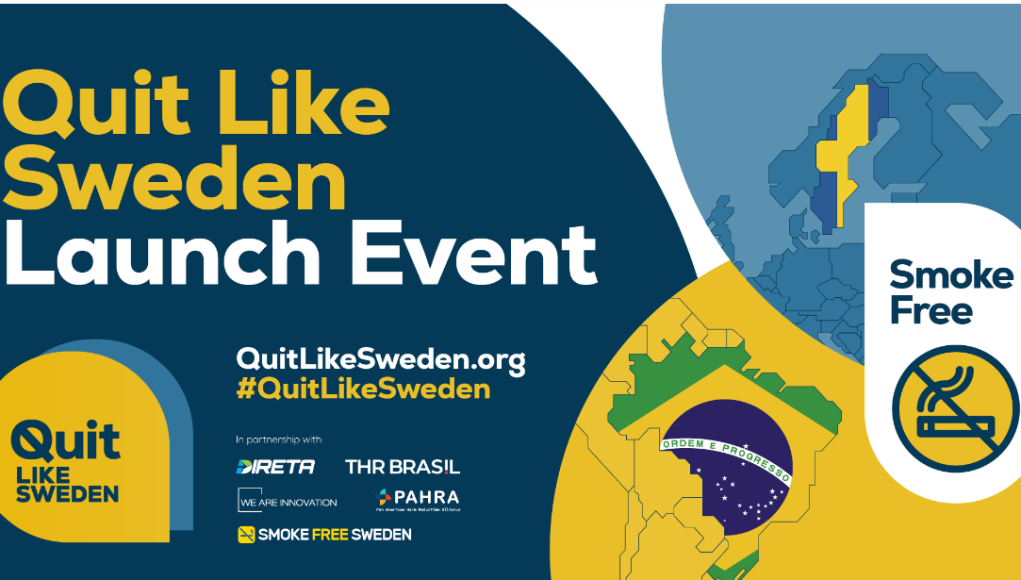At the conference, Suely Castro launched the ‘Quit Like Sweden’ mission, aiming to inspire countries worldwide to replicate Sweden’s success in achieving a smoke-free society. Characterized by comprehensive cessation and prevention strategies alongside policies promoting alternatives to smoking, Sweden’s approach has led to a record breaking reduction in smoking prevalence, nearing the official ‘smoke-free’ threshold of 5%.
The event featured discussions on Swedish and Brazilian policy initiatives, highlighting the importance of informed policymaking in combating smoking. Swedish MP Jesper Skalberg Karlsson and Brazilian policymakers addressed public policy issues, emphasizing the need for evidence-based measures to combat misinformation and ensure accessibility to smoking alternatives.
Over a million lives could be saved in Brazil if it followed Sweden’s example
The conference also explored the potential of Sweden’s experience in saving lives in Brazil, with research released on the day indicating that Brazil could save 1.36 million lives by 2060 if it adopted the Swedish approach. Panelists, including renowned public health experts Dr. Delon Human and Dr. Anders Milton, discussed the applicability of Sweden’s approach to Brazil’s context, underscoring the importance of collaborative efforts in implementing effective tobacco control strategies.
In sessions focusing on public health policymaking, renowned experts in the field such as Dr. Roberto Sussman, Dr. Konstantinos Farsalinos, Dr. Chris Russell, David Sweanor, and Dr. Marewa Glover, shared insights into policy development and implementation. Discussions revolved around leveraging scientific evidence, behavioral psychology, and legal frameworks to promote smoking cessation and harm reduction initiatives.
By drawing attention to Sweden’s successful approach and facilitating international collaboration, the event aimed to accelerate progress towards a smoke-free future globally. Sadly however, moving in the opposite direction, earlier this week the Brazilian Health Surveillance Agency (Anvisa) unanimously voted in favour of upholding the current strict vape regulatory framework.
Will Brazil stick to prohibition?
The current vape ban, which has been in place since 2009, restricts manufacturing, sales, importation and advertising of vaping products. Despite the prohibition, the products are widely available in small shops and online stores, and the lack of regulations on the products are, as expected, leading to increased consumption, particularly among young people. A survey by the Brazilian Institute of Geography and Statistics (IBGE) found that 16.8% of students aged 13 to 17 had tried vaping at least once in their lives.
Anvisa President Antônio Barra Torres referenced a December 2023 World Health Organization (WHO) publication that advises against permitting e-cigarette sales. He also proposed additional measures to combat the illegal sale of vapes, including joint campaigns with the Ministry of Education and increased inspections to seize illegal products. Unfortunately, peer reviewed research has shown that the WHO’s recommendations do not work. In fact, the opposite is true, vaping and smoking are higher in countries following the agency’s guidelines.
Brazil’s stance on e-cigarettes contrasts with that of countries which have successfully reduced smoking rates, and have implemented regulations for controlled sales. The Brazilian Tobacco Industry Association (ABIFUMO) criticized the ban, arguing that it ignores lessons from over 80 such countries that have authorized vape sales with specific controls and taxation.
In addition to Anvisa’s decision, there’s ongoing debate in the Senate about a bill to permit the production, import, export, and consumption of e-cigarettes in Brazil. However, this proposal is still in its early stages without a set voting date. Unfortunately, despite the ongoing discussions and available science on the matter, the local healthcare sector, including the Brazilian Medical Association and the Brazilian Society of Pulmonology, support Anvisa’s stance, due to alleged risks and exposure to toxic substances found in vapes.








